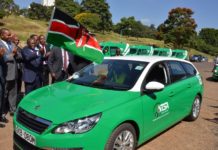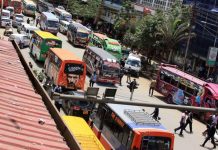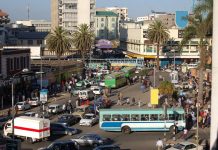For close to three years, thousands of Kenyans were ‘convicted’ on the roads for speeding.
With a speeding accusation from police officers manning the speed guns, bribes were quickly paid, and the offenders drove off leaving crooked police officers the richer.
Those who took the system on, and challenged these charges, were hounded to court, but only after parting with cash bail that was set at Sh10,000 most of the time.
In the corridors of justice, these trials would open a can of worms on the veracity of the speed gadgets, with fewer convictions, if any.
From trickery by authorities to ‘faulty’ speed guns and a careful play with various sections of the law, Kenyans paid a high price as police officers moved to enforce speed limits.
Now, a series of High Court decisions reviewed by the Nation has revealed that several magistrates could have put several motorists to the sword on account of trickery by authorities tasked with manning Kenya’s roads.
Businessman Stanley Kihiko Mutungu was flagged down by National Transport and Safety Authority officers while driving his Mercedes Benz along the Nairobi-Naivasha highway on October 3, 2016 and was accused of speeding.
Traffic Act
The officers accused Mr Mutungu of exceeding the 100 kilometres per hour speed limit prescribed for the Nairobi-Naivasha highway. This meant that he should have been charged with violating section 70 (1A) of the Traffic Act.
Section 70 (1A) provides that anyone that drives above a prescribed speed limit for a road is liable for a fine of at least Sh20,000 or a jail term not less than three months.
The back and forth between Mr Mutungu and the NTSA officers set in motion a series of events that would give an insight into some of the strange goings-on in Kenya’s traffic courts.
Mr Mutungu was charged in the Naivasha Traffic Court on October 14, 2016 for exceeding the speed limit prescribed for a class of motor vehicles, under section 42(1) of the Traffic Act.
Under Kenyan law, vehicles are classified according to their weight and engine capacity. Vehicles heavier than four tonnes can move at a maximum speed of 80 kilometres per hour.
But Mr Mutungu’s Mercedes Benz is under Class B, which has passenger vehicles weighing up to 3.5 tonnes and can carry up to eight passengers.
Vehicles in Class B do not have a capped speed limit, but drivers must respect the prescribed speed limit of the specific road or area they are in.
But somehow, Mr Mutungu was accused of exceeding the speed limit of his vehicle’s class.
In court, Mr Mutungu denied speeding, but also formally protested as he argued that he was being charged under a non-existent law. But the magistrate ordered that the case proceed.
Mr Mutungu then requested that he be furnished with evidence, including the speed gun used to detect the speed NTSA alleged he was travelling at.
The prosecutor argued that the speed gun was being used in the field and that presenting it in court would hamper NTSA operations on the highway. The magistrate also refused to allow presentation of the speed gun in court.
Fresh charge
Mr Mutungu filed a High Court petition challenging the speeding charge. The High Court dismissed the petition, which took nearly three years to determine, and told the businessman to go back to the magistrate’s court and plead his defence.
On April 17 last year, the Office of the Director of Public Prosecutions (ODPP) called its first witness, the arresting officer, who testified that Mr Mutungu had exceeded the speed limit.
After the investigating officer testified, the prosecutor sought permission to amend the charge sheet.
In a strange twist, rather than a fresh charge, the ODPP filed an application seeking to drop the case against Mr Mutungu.
Mr Mutungu opposed the withdrawal after the ODPP revealed that it would still be interested in pursuing the businessman if concrete evidence turned up later.
His lawyers pushed for a complete withdrawal with no chance of future prosecution.
The magistrate refused the ODPP’s planned withdrawal and ordered that the case proceed. The ODPP appealed the decision, and on February 3, 2020 the High Court allowed prosecutors to drop the case.
Aside from the time spent pursuing the case, Mr Mutungu bore legal costs as he hired a lawyer to defend him and file the High Court petition.
But Mr Mutungu’s case is just one among several that make for a comedy of errors by magistrates, whose decisions have gone on to be successfully challenged at the High Court.
An analysis by the Nation shows that a lot of cases filed from 2015, when the speed guns were in force, collapsed after police officers, who had preferred speeding charges on drivers failed to turn up in court.
From these cases, it emerged that NTSA officers — together with their traffic police counterparts — terrorised motorists using these guns through mishandling of complaints and their inability to sustain court case filed by those daring enough to take on the system.
In most of these cases, the police also failed to produce computer printouts of the speed results with a certificate showing the police officer who took the speed of the affected drivers’ vehicles on the material date they were accused of driving beyond the allowed speed limit.
Speeding offence
Furthermore, the police officers also failed to produce certification from the Kenya Bureau of Standards to show that the speed gun used was in good condition at the time it was used to record the alleged speeding offence. They also failed to produce a service sheet of the speed gun to authenticate its working condition.
In 2016, former Rift Valley Law Society of Kenya (LSK) chairman Kipkoech Ng’etich sued the NTSA at the High Court in Kericho challenging its use of speed guns on Kenyan roads.
He was also seeking Sh10 million in compensation for the alleged “malicious charges”.
Mr Ng’etich’s suit arose after police charged him with speeding along the Nakuru-Kericho highway, which was later dropped after the police, twice failed to show up in court.
In his suit, he wanted the transport regulator to provide the service sheet for the speed gun, and the printout of the speeding results. This never happened.
But speed guns were not the only gadgets used to terrorise drivers; the infamous Alcoblow machines were also deployed, and those who went through the justice system felt cheated.
On the night of December 31, 2017, matatu driver George Wambugu Thumbi, went partying with friends and family. On New Year’s Day 2018, he reported to work and was flagged down by NTSA officers along the Nyeri-Nyahururu highway.
When he blew into the breathalyser, the device read that he had a 0.29 milligrammes per litre alcohol level.
He was arrested and detained at Kiganjo Police Station before being charged on January 2, 2018.
Legally, drivers can have up to 0.305 milligrammes per litre alcohol level, but Public Service Vehicles drivers are expected to retain theirs at 0.0 milligrammes per litre.
The magistrate accepted Mr Thumbi’s guilty plea and ordered that the matatu driver to pay a Sh100,000 fine or go to jail for one year. The case took more than one year to conclude.
Another matatu driver Benjamin Ireri had served eight months of a one-year sentence for being slightly inebriated when the High Court ordered his release.
Mr Ireri was arrested on March 8, 2016 and pleaded guilty to driving under the influence of alcohol.
High Court Judge Florence Muchemi ordered for his release after faulting the Embu Magistrate’s Court for not being lenient to Mr Ireri, who was a first time offender, and for not considering that the prosecution did not table any evidence that the motorist was not in control of the vehicle.
SOURCE: allafrica.com








![Top 20 Used Cars to Avoid Buying in Kenya – [PHOTOS]](../../../blog/wp-content/uploads/2013/11/top-used-unreliable-cars-to-avoid2-80x60.jpg)
![Top 20 Used Cars to Avoid Buying in Kenya – [PHOTOS]](../../../blog/wp-content/uploads/2013/11/top-used-unreliable-cars-to-avoid2-100x70.jpg)






